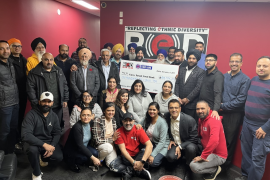March 23, 2021
Photo above: Delta Police Youth Services Team members – Constables Mike Grandia and Kristine Pemberton
Delta Police is focused on ‘community policing’, but it can be hard to explain what that really means. For one Delta family and their troubled son, community policing meant a prolonged effort between police and other agencies, to convince the youth that he was worth fighting for.
We recently received a letter from the youth’s father, which eloquently described the impact of community policing, and honestly puts it far better than we could. To protect their privacy, we’ve removed some details.
This particular family has strong roots in the community, with kids involved in sport and attending a local church. A “nice normal family” by any definition. But then the father wrote, “Our interactions with Delta Police have been at some of the lowest points in our lives. The past couple years have been very difficult as our son got addicted to drugs and involved in criminal activity in Delta.”
Their son refused to accept he had an issue with substances and refused to engage in supports. The father acknowledged his son’s actions were hurting himself, his family and the community.
“With other illnesses such as cancer or diabetes, the family is looked upon with compassion and seen as being brave for dealing with the extremely difficult circumstances. In contrast, with the disease of addiction, there is shame that somehow the addict and the family are failures for letting it happen in the first place, not getting it under control and ultimately not making it go away. Some of the shame I have felt was self-imposed while some of the judgement I experienced was real,” wrote the father.
“One of the keys to addiction recovery is connecting to positive influences and having a sense of belonging to a community. We’ve had many interactions with the Delta Police and by and large, the officers did a great job of balancing the need to hold my son accountable while showing compassion, care and an interest to help him get to a better place (not an easy thing to do).”
DPD school liaison officers are often children’s first point of contact with the police – starting in elementary school officers offer age-appropriate interactions with kids, from stickers and checking out a police car in kindergarten, to sessions on bullying or safe use of the internet or social media.
With this family the District Liaison officer – a community point of contact – also established contact, following up at the family’s request to try and offer guidance and support.
By the time the Delta Police Youth Services Team, Constables Mike Grandia and Kristine Pemberton, began to provide support the father readily admitted things were not good. This team works closely with the community to develop and implement successful programming, while utilizing trauma-informed practices related to substance misuse, education, justice-based programming, mental health, physical literacy and overall community health and wellness. The success of these initiatives are based on shared language, goals and values. These include compassion, patience, shared decision making, kindness, open/honest communication and by meeting communities, families and individuals “where they are at.”
In this instance, The Youth Services Team provided support related to counselling services and specialized programs. The father notes the officers also “talked to us with compassion and without judging. Constable Pemberton was one of the only people my wife felt comfortable talking to when things were at their worst.”
Constables Pemberton and Grandia also provided advice, and helped the family keep their son safe. At times they even drove around Delta looking for the youth, so they could give him a care package. Finally, the constables worked to get the youth into treatment, checked in on him, and celebrated his successes with the whole family.
When negative behaviors took place in the community, the Youth Services Team supported the family to encourage the son to take responsibility for his actions – in this case a diversion plan to help the youth make amends for his mistakes. “My son was proud when he finished his diversion,” wrote the father.
“To me, community policing is about making sure the community is safe andhealthy. With youth, community policing is about holding them accountable while doing everything possible to keep them out of the justice system. This approach serves the needs of the community, and the family,” he said.
“For a youth with addiction, community-policing means making a connection, helping to keep the person safe, supporting the parents, and working to get services in place,” wrote the father. “Our family is an example of the positive outcomes that are made possible by Delta Police’s community model and, specifically, the high-risk youth outreach program. Our son was worth the effort. Every family deserves the effort.”
Those are powerful statements, which resonated so much with our officers and staff, that we sought permission to share them with all of Delta.
“This family is now celebrating several milestones with their son,” says Staff Sergeant Brian Hill, who oversees the DPD units and programs that connected the youth to help. “Their son is about to celebrate 12 months free of substances. He provides peer support at the treatment center he attended, and has completed a diversion program. He’s at school full time and is back to helping around the house and joining in family activities. That’s fantastic. I’m so proud of all the officers who worked with this family, and who are now celebrating the youth’s achievements with them.”





